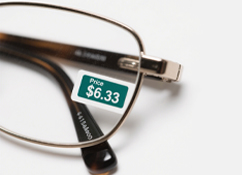How to Care for Eyeglass Lenses: Stop Scratches + Clean Them the Right Way
I’ve had this experience too: Back in school, I did well academically, but post-graduation, I’ve forgotten most of what I learned. The only “takeaways”? Worse myopia (nearsightedness) and a stack of old glasses. I really envy people who don’t wear glasses—they wake up in the morning and can see the world clearly without fumbling for frames. With my strong prescription, I’ve even made a fool of myself sans glasses: A friend waved from across the street, and I stared blankly, not recognizing them until they were right in front of me.
Glasses are a hassle not just because “you can’t function without them”—the bigger problem is that lenses scratch so easily with daily use. Bad scratches block your vision, forcing you to replace lenses entirely. Today, we’re breaking down daily care tips to keep lenses scratch-free (and lasting longer), plus safe ways to fix minor scratches if they happen.
3 Key Rules for Eyeglass Lens Care (Avoid Scratches!)
Lenses will wear down over time, but good habits can drastically extend their life. Focus on these three steps:
1. Stop Touching Lenses with Your Hands
Fingerprints are one of the biggest annoyances with glasses—and they’re avoidable. The oil on your hands leaves greasy smudges, and rubbing those smudges away over and over doesn’t just make them more noticeable—it creates friction that scratches lenses over time.
Even if you’re adjusting your frames, touch the temples (side arms) or nose pads—never the lens surface. This small habit cuts down on how often you need to clean them, and keeps lenses smoother longer.
2. Wipe Lenses the Right Way (Ditch the Shirt/Notebook Paper!)
When lenses get dusty or smudged, most people’s first move is to wipe them with their shirt, jeans, or notebook paper. Big mistake—those fabrics have rough fibers that scratch lenses in seconds, especially if you press hard.
Here’s the correct way to wipe lenses:
Fog them first: Breathe gently on the lenses until they fog up (this loosens dust and softens fingerprints, so you don’t rub particles into the lens).
Use a dedicated eyeglass cloth: Grab a microfiber eyeglass cloth (the kind that comes with new glasses—replace it if it gets dirty!).
Wipe in one direction: Swipe left to right (or top to bottom)—never back and forth. Back-and-forth wiping rubs dust against the lens, which causes more scratches.
Pro tip: At night, wipe lenses clean before putting them in their case. This keeps dust from building up overnight, so they’re ready to wear in the morning.
3. Clean Your Glasses + Eyeglass Cloth Regularly
Wiping alone isn’t enough—your cloth and glasses need deep cleans every few weeks to stay effective.
Clean your eyeglass cloth every 2 weeks:
Over time, the cloth collects dust, oil, and dirt—wiping with a dirty cloth is like rubbing sand on your lenses. Wash it with mild soap or laundry detergent (skip fabric softener—it leaves a residue that smudges lenses), then air-dry it completely before putting it back in your case.
Clean your glasses every 2 weeks (with the cloth!):
Rinsing under water isn’t enough to remove built-up oil or grime. Here’s how:
Rinse lenses under lukewarm water (not hot!) to wash away surface dust (this prevents scratching when you scrub).
Add 1 drop of mild dish soap (avoid harsh/alkaline soaps—they damage anti-glare or anti-scratch coatings).
Gently rub the lenses with your fingertips (use light pressure—no scrubbing!).
Rinse thoroughly, then dry with your clean eyeglass cloth.
Dish soap also helps reduce fogging later—bonus!
How to Fix Minor Scratches (Safe Methods—No Sandpaper!)
Even with careful care, lenses might get shallow scratches. For tiny, barely visible ones, try these safe fixes (skip deep scratches—they need professional help):
1. Fix Minor Scratches with Non-Abrasive Toothpaste
This works for shallow scratches (think: you can barely feel them with your finger). Never use abrasive toothpaste (like “whitening” or “exfoliating” formulas)—they’ll make scratches worse.
Steps:
Rinse the lens under lukewarm water to remove dust.
Put a tiny dot of white, gel-based toothpaste (non-abrasive!) on your fingertip.
Gently rub the toothpaste over the scratch in a circular motion for 10–20 seconds (use light pressure—too hard damages the lens).
Rinse the lens thoroughly with water, then dry with a clean eyeglass cloth.
Check if the scratch is less visible—repeat once if needed.
2. Temporarily Hide Ultra-Fine Scratches with Rubbing Alcohol
This doesn’t “fix” scratches—it just masks them temporarily (great for a quick fix before a meeting or outing).
Steps:
Grab a cotton swab and a small amount of 70% rubbing alcohol (higher concentrations can damage lens coatings).
Gently wipe the swab along the direction of the scratch (not across it).
The alcohol temporarily fills in tiny grooves, making the scratch less noticeable.
Note: This fades once the alcohol dries—don’t rely on it long-term.
When to Replace Lenses (Don’t Ignore Deep Scratches)
If scratches are:
Deep enough to feel with your finger,
Blocking your vision (even a little),
Causing eye strain or headaches,
Stop trying at-home fixes—take your glasses to a professional optical shop. They can:
Check if the lens can be polished (only works for very shallow scratches),
Recommend replacing the lens if the damage is too bad.
Wearing scratched lenses strains your eyes over time—don’t put off replacing them!
Final Tips for Longer-Lasting Lenses
Store glasses in a hard case: Soft pouches don’t protect against drops or pressure (e.g., in a purse or backpack). A hard case keeps lenses safe from bumps.
Take glasses off with both hands: Taking them off by one temple stretches the frame and can shift the lens—leading to scratches if the lens hits a surface.
Avoid placing glasses lens-down: Set them on their temples or in a case—never face-down on a table, counter, or desk.
Caring for eyeglass lenses isn’t complicated—it’s just about small, consistent habits. With the right care, your lenses can last 1–2 years (or longer!) before needing replacement. And when you do need new lenses, you’ll know you got the most out of your old ones.











